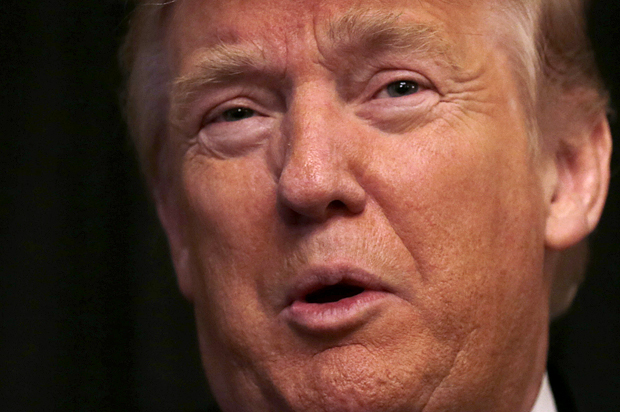 The Republican Party is running out of time and options to stop Donald Trump after winning as expected in Nevada’s Tuesday night caucuses, although party insiders are increasingly desperate about what to do.
The Republican Party is running out of time and options to stop Donald Trump after winning as expected in Nevada’s Tuesday night caucuses, although party insiders are increasingly desperate about what to do.
Trump, who was leading in Nevada polls—where he has a big Las Vegas hotel-casino—won his largest percentage yet in any of 2016’s caucuses and primaries, with 46 percent of the vote, which was almost twice as much as both Marco Rubio (24 percent) and Ted Cruz (21 percent) received.
So far, 1.2 million Republicans in four states—Iowa, New Hampshire, South Carolina and Nevada—have participated in caucuses or voted, in contests where 133 delegates have been at stake under party rules where 1,237 are needed for the presidential nomination. Cruz won Iowa. Trump has won everything since. And next week is when 15 states, with 699 delegates, will vote in primaries or hold the first stage in caucuses on March 1, so-called Super Tuesday.
Right now, the latest polls in those states listed on RealClearPolitics.com show Trump ahead in nine of those states—Georgia, Massachusetts, Minnesota, Oklahoma, Alabama, Tennessee, Virginia, Arkansas and Vermont. Cruz is ahead in Texas and Arkansas. And Ben Carson is ahead in Colorado, but that survey was taken in November, rendering it meaningless. If Trump wins all these states, he stands to gain upward of 400 delegates, where as the prior states only had 133 delegates in play and awarded some to non-winners.
Beyond the math, the Republican Party establishment is in a real tizzy over what to do. An array of scenarios have been floated—such as pundits like Larry Sabatosuggesting Rubio and John Kasich team up, creating a way to likely win Florida and Ohio in the fall. Others have pushed a Cruz-Rubio ticket. Still others have said true conservatives may need to back a third-party candidate. And other GOP strategists have suggested that maybe New York City’s former mayor Michael Bloomberg might be more acceptable than another Clinton presidency. Or they are saying principled Republicans might just have to sit this one out, while others respond that’s impossible, they cannot surrender the party’s brand.
No matter the fanciful fantasy embraced, the reality is the clock is running out on the GOP to stop Trump’s hostile takeover of the party. This is not a conclusion based on the particulars of Trump’s showing in Nevada—as he is very well-known there—but more on the weaknesses of Rubio and Cruz as seen in that state. As Nate Silver at FiveThirtyEight.com noted, Rubio still hasn’t won a single state, and Cruz lost badly in Nevada and before that in South Carolina among constituencies thought to be his best supporters.
“He carried only 27 percent of the white born-again and evangelical Christian vote, behind Trump’s 41 percent. Cruz also lost this group in New Hampshire andSouth Carolina,” Silver and Harry Enten co-wrote. “Cruz also trailed among ‘very conservative’ voters in Nevada, 34 percent to Trump’s 38 percent.” In short, even if Cruz wins his home state of Texas and nearby Arkansas next Tuesday, as RealClearPolitics’ latest polls have him 4 to 5 points ahead of Trump in both states, it is looking like the beginning of the end of the Cruz campaign.
Of course, the only thing certain about the 2016 campaign trail is nothing is certain. But next Tuesday’s dozen GOP contests with half of the delegates needed to secure the nomination in play is going to be a milestone that can’t be ignored. It is likely that the most virulent voters in the party’s base, who have embraced Trump’s boasts, bullying, bigotry and brashness will be on their way to vanquishing their party’s pro-corporate elites.
Where this goes next is unclear, but it’s surely not toward scenarios where cooler heads will prevail—even if Trump will surprise everyone by trying to sound more moderate after fanning the flames. Anybody who has been on the receiving end of GOP tirades (pro-choice women, LBGT individuals, voters in communities of color, climate change scientists, undocumented migrants, labor unions, etc.) or suffered from their obstructionism—as epitomized by Senate Republicans refusing to consider a Supreme Court nomination—knows the modern GOP has been extremist for years.
The difference now is Trump’s ascent seems to have brought an old and ugly form of mob rule into mainstream view, whereas pledges years ago by now-Republican Senate Majority Leader Mitch McConnell to impede President Obama at every turn and create a failed presidency were cloaked in more “acceptable” partisan gamesmanship under Washington’s political rules.
As many people have noted, Republicans have sown the seeds of Trump’s increasing electoral successes for years. But now they have to live with the consequences, which may mean the end of their party as many know it. The time appears to be running out to stop Trump from gaining the nomination, making the immediate future a belwether for where one of the country’s major parties is going—over the edge and toward a darkening unknown.

